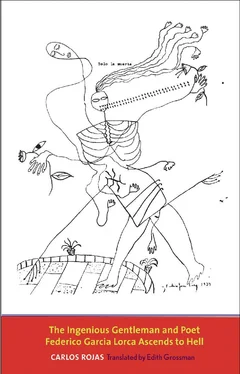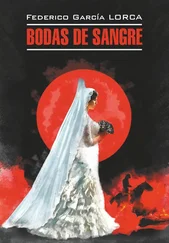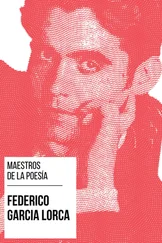“Whoever expedited this denunciation will answer for it,” he states in a loud voice so the members of Popular Action can hear him. “You’ll be home as soon as I find Pepe. In the meantime, try to be calm.”
“Send a blanket, please, and tobacco. I beg you. It’s August and I’m shivering with cold.”
“Yes, yes, of course.”
“And find a lawyer too. Pérez Serrabona is my father’s attorney, and he can put you in touch with him.”
“I will, I will, though it isn’t necessary. It’s less than nothing, Pepe will resolve this mess and get you out. Be calm and don’t despair.”
Trescastro stops the car in front of the Civilian Government building. On the stage in this theater of mine, August gilds the streets. Two Falangistas, their shirts undone, stand guard at each side of the entrance. In a few moments, if I continue with the evocation of the afternoon under the last skies I’ll see alive, one of the sentinels will try to hit me with the butt of his rifle. He’ll do this without anger or ill will, as he undoubtedly attacks all the prisoners as they cross the threshold. He’s almost an adolescent and has not yet tried to veil the liquid of illuminated surprise that lights the eyes of childhood. He is content to attack us with the irrational indifference of children who stone stray dogs or pursue lizards with a stick, precisely because in his eyes we cease being men and are transformed into a stupid, malignant species very inferior to lizards and dogs on the scale of the moral values of animals. It is also true that an angry Ruiz Alonso intervenes, though this is the only truth among his lies and is more a defense of his own pride than of my helplessness. “How do you dare, wretch? In my presence!” he shouts now on the stage as he had roared then on the street.
In reality, pun intended, everything is repeated punctually and precisely even though a part of my dead man’s consciousness remains waiting for a variant, an inevitable discrepancy. (PREPARE FOR YOUR TRIAL.) Trescastro takes his leave of Ruiz Alonso and says he is going home. Miguel, on the other hand, goes with us into the Civilian Government building and shouts at Ruiz Alonso, in a voice loud enough for everyone to hear, that he wants to speak with the governor in his presence. Ruiz Alonso shrugs his laborer’s shoulders in a way that is both disdainful and indifferent. Surprised, I understand that Miguel will use the name of his brother Pepe to attempt to avoid torture in my interrogations. I think of Manolo, for whom I never felt more affinity in my life (“They killed my brother-in-law Manolo. My father called this morning to tell me”), and I wonder how much he suffered until death became his desperate liberation. In the Civilian Government offices an unexpected silence reigns, interrupted only occasionally by the tread of boots or the clatter of a typewriter. And yet the building, like certain of Poe’s houses (“Tel qu’en Lui-même enfin l’éternité le change.” “You haven’t read anything by Mallarmé either? Fillet , intellectually you’re a virgin and martyr. A monster of the South, innocent and brilliant like a camellia in flames or a burning giraffe. I’ll have to go to bed with you to sow my culture in your soul”), has an invisible life of its own that is ominous and sinister. One might call it a labyrinth of facing walls that terrified hands have scratched from the floor to the edge of eternity, or a collection of surgical instruments, the treasure of a surgeon turned torturer, fallen to the ground and transformed in this mansion by virtue of a miracle in reverse, a portent of the Black Mass. I look at Miguel and understand how much he fears and suffers for me at this moment. Suddenly I also realize that the entire Rosales family must descend from a remote line of converted Jews, though I never noticed it before and they had forgotten it in another century. It’s enough to see Miguel’s face now, when anguish deepens all his features with a chisel, and it’s enough to think about the religious devotion of the entire family as well as their self-sacrificing solidarity with those who are persecuted, an apparent contradiction to their proven fascism.
PREPARE FOR YOUR TRIAL.
With no surprise, almost with the fatigued, sad indifference of someone waiting for the last inscrutable line that will close his poem, or the encounter with the man who will change the entire meaning of his existence, the inevitable difference between the past and its representation on the stage through my memories appears on a whitewashed wall in the Civilian Government building. Next to the office of the Pontius Pilate who presides over this place, at the height of the forehead of a smooth-faced soldier guarding the room, there was nothing but the stain of a good amount of damp on the day they took me there under arrest. A kind of unexpected plagiarism of a shadow puppet, improvised with the thumb, index finger, and middle finger of one hand, crossed over the wrist by the middle finger, index finger, and thumb of the other, to represent together a kind of seated rabbit. Now, on the stage, eternity copies everything in hell, including the silhouette of the young rabbit. In a manner where arrogance leaves no trace of caution, even at the moment of his victory over the Rosales family, Ruiz Alonso tells Miguel that the governor has gone to the front and today Lieutenant Colonel Velasco is his replacement. Miguel nods, not looking at him or responding, as a gruff prince would treat a gentleman-in-waiting suspected of stealing. (“This bastard, may all the demons of hell shove it up his ass, told me you did more harm with your pen than others with a pistol.”) Nonetheless, and precisely on a stage of this spiral, which Miguel could not have devised with his imagination of a Falangista singer to the Virgin, above the shadow of the rabbit rampant, and just beside the wall, some letters erupt as golden and bright as the ones that appeared on the window of the Andalucía express. They end with a great question mark that seems to be of blinding gold, as if all a summer’s wheat had melted on the scythe. In front of it, very large and well spaced, nine words ask me: WHY DON’T YOU PRETEND YOU’RE CRAZY AND BE ACQUITTED?
On stage the question in gold letters imprinted on the wall of the Civilian Government Building of Granada faded away. All that remained was the stain that outlined the shadow of a rabbit. Then the wall and door to the governor’s office merged, as if sinking gradually into deeper and deeper waters. Finally the set appeared, empty of memories and filled with shadows. It was then, when he turned in his seat, that he saw the stranger sitting beside him, almost elbow to elbow, shoulder to shoulder. He had emerged unexpectedly in the alabaster light from the passageway.
He gave a start because he never had seen anyone in the corridor or the theaters of the spiral. With no particular feeling and naturally with no distress at all, he had concluded that the dead were blind and deaf only among themselves. “I’m dreaming,” he said to himself and immediately recalled that death was eternal wakefulness if innocence was not proved at trial. (WHY DON’T YOU PRETEND YOU’RE CRAZY AND BE ACQUITTED?) Then he thought he had lost his mind: a phantom driven mad by the solitude of hell but still rational enough to be aware of his own insanity. Almost immediately he resolved that the presence of the other man, in the next seat, was not a dream or a hallucination. In silence, the stranger observed him carefully as if making an effort to recognize him.
He thought that if recollections of what had been lived and the memory of what had been imagined appeared on the stage, perhaps on the eve of the trial other phantoms would do the same in the orchestra seats. In any case, if that man was a shade of his reason or his delirium, he could not recognize him or leave his side even though no physical force kept him in the grasp of his seat.
Читать дальше












